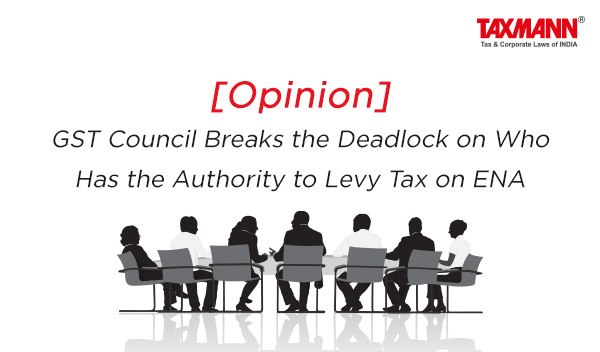[Opinion] GST Council Breaks the Deadlock on Who Has the Authority to Levy Tax on ENA
- Blog|News|GST & Customs|
- 2 Min Read
- By Taxmann
- |
- Last Updated on 20 October, 2023

Harshith Sharma – [2023] 155 taxmann.com 310 (Article)
After the roll out of the prestigious and landmark One nation one tax (GST) there were handful of issues which are mired with ambiguity and controversy. One such vexatious issue is around taxation of Extra Neutral Alcohol (ENA). The issue started simmering and gained its momentum when GST authorities issued notices to ENA manufacturing companies, demanding for payment of tax @18%. The heart of the conflict lies in foundational provisions of GST viz article 366(12A) of the constitution promulgated through 101st amendment. This article of the constitution defines Goods and services tax, as any tax on supply of goods or services or both except taxes on the supply of alcoholic liquor for human consumption.
The afore-stated article of the constitution categorically excludes alcoholic liquor for human consumption from the ambit of GST. However, ENA is a type of food grade alcohol which contains more than 95% of alcohol by volume which in its pristine form is not potable unless further distilled.
This conspicuous distinction between alcoholic liquor and ENA fortified the claim of Central Government to levy GST on ENA as it is not potable. Conversely, from the other end of the spectrum, it was contended that since ENA constitutes as a fundamental ingredient in the production of alcoholic liquor if central government levy’s GST it would obliquely tantamount to regulation on sale of liquor which runs counter to fundamentals of the constitutional framework. This indirect influence of central government over sale of liquor for human consumption by levying the GST on one of principal ingredients (ENA) has led the State Government to passionately advocate in favor of excluding ENA from the purview of GST.
This dichotomy has left the liquor manufacturing industry in great deal of suffocation and seeking the legal remedies seemed unviable as the apex court has also expressed conflicting viewpoints on this issue. This has resulted into a growing clamor which necessitated the intervention of GST council to restore the harmony. Council after sidelining this issue on more than one occasion has finally in its recently concluded 52nd council meeting has conclusively set this ambiguity to rest.
Click Here To Read The Full Article
Disclaimer: The content/information published on the website is only for general information of the user and shall not be construed as legal advice. While the Taxmann has exercised reasonable efforts to ensure the veracity of information/content published, Taxmann shall be under no liability in any manner whatsoever for incorrect information, if any.

Taxmann Publications has a dedicated in-house Research & Editorial Team. This team consists of a team of Chartered Accountants, Company Secretaries, and Lawyers. This team works under the guidance and supervision of editor-in-chief Mr Rakesh Bhargava.
The Research and Editorial Team is responsible for developing reliable and accurate content for the readers. The team follows the six-sigma approach to achieve the benchmark of zero error in its publications and research platforms. The team ensures that the following publication guidelines are thoroughly followed while developing the content:
- The statutory material is obtained only from the authorized and reliable sources
- All the latest developments in the judicial and legislative fields are covered
- Prepare the analytical write-ups on current, controversial, and important issues to help the readers to understand the concept and its implications
- Every content published by Taxmann is complete, accurate and lucid
- All evidence-based statements are supported with proper reference to Section, Circular No., Notification No. or citations
- The golden rules of grammar, style and consistency are thoroughly followed
- Font and size that’s easy to read and remain consistent across all imprint and digital publications are applied



 CA | CS | CMA
CA | CS | CMA
